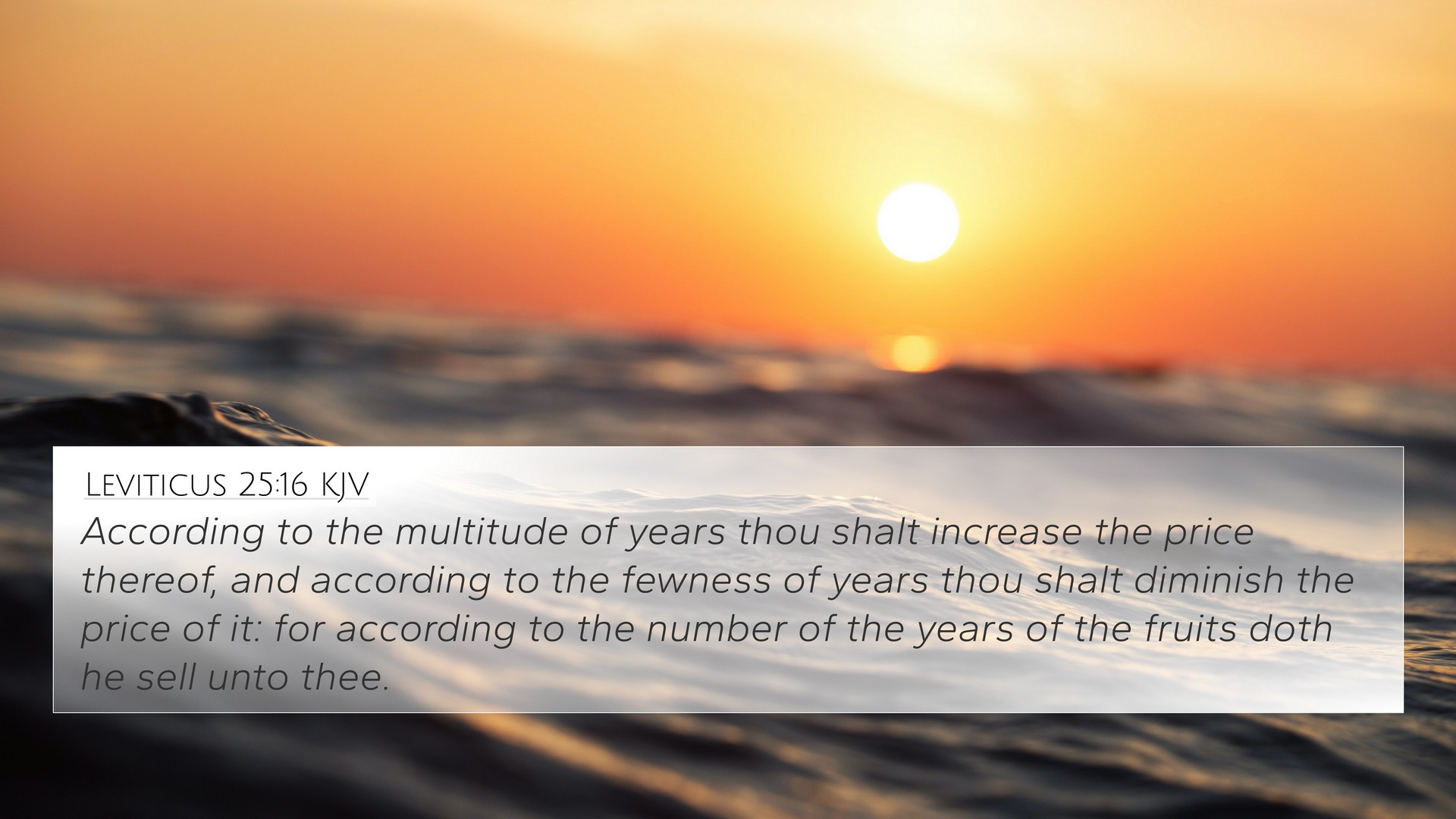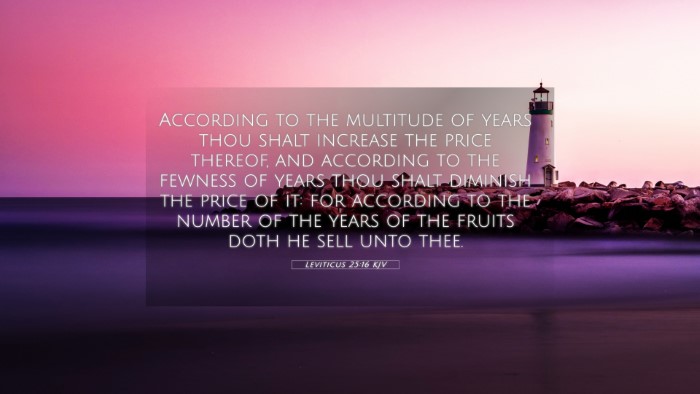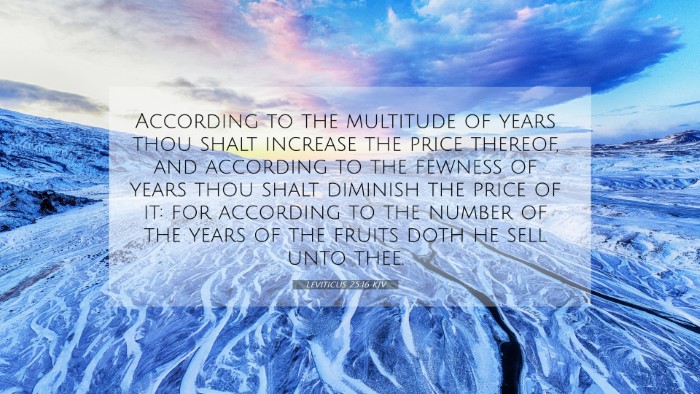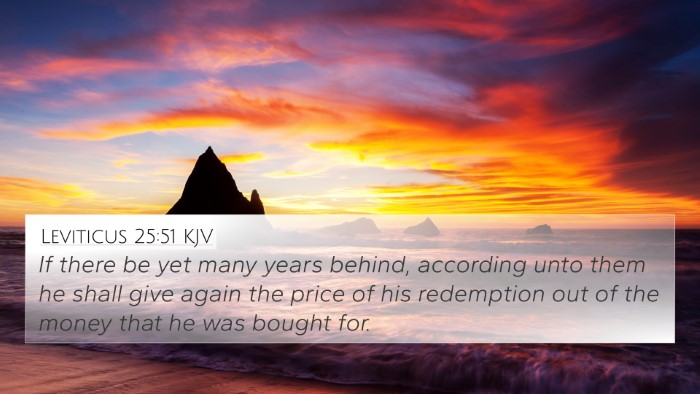Understanding Leviticus 25:16: Insights from Public Domain Commentaries
Leviticus 25:16 states, "According to the number of years after the jubilee thou shalt buy of thy neighbor, and according unto the number of years of the fruits he shall sell unto thee." This verse plays a critical role in the divine economic system established for Israel, emphasizing themes of justice, social responsibility, and divine order.
Interpretation and Meaning
This verse outlines a principle of fair economic dealings among the Israelites, rooted in the context of the year of Jubilee—a time of restoration and liberation. The teachings can be comprehended through insights from noted commentators such as Matthew Henry, Albert Barnes, and Adam Clarke:
-
Matthew Henry:
Henry emphasizes the moral and social implications of the law, illustrating that it promotes equity. Buyers are urged to be cautious and just, allowing for the realities of land usage and its cyclical nature, ensuring that transactions reflect the years until the next jubilee.
-
Albert Barnes:
Barnes notes the significance of the jubilee as a time for returning to one's possession, reinforcing the idea that economic activities must honor existing divine ordinances. He stresses the Israelites’ need to consider the long-term implications of their purchases, linking trust in God’s provision with responsible stewardship of resources.
-
Adam Clarke:
Clarke provides a detailed explanation of the Jubilee system, discussing its purpose to prevent perpetual poverty and ensure that land remained within families. He asserts that this legislation was vital for maintaining social balance and preventing the accumulation of wealth by a few at the expense of many.
Thematic Connections and Cross-References
This verse can be linked to various other Scriptures that reflect similar themes of stewardship, justice, and community responsibility. Below are some notable cross-references and their connections:
-
Exodus 21:2-6:
This passage discusses the rules regarding Hebrew servants and their release in the seventh year, paralleling the themes of liberation and the cyclical return of property and freedom seen in Leviticus 25:16.
-
Deuteronomy 15:1-2:
This text further explains the year of release, demonstrating God's concern for the marginal and economically vulnerable.
-
Job 31:16-22:
Job speaks of his treatment of the poor and needy. His commitment complements the justice espoused in Leviticus and emphasizes the responsibility of the wealthy toward the less fortunate.
-
Isaiah 61:1-3:
This prophecy proclaims the announcement of good news and release, connecting back to the themes of the jubilee and social restoration.
-
Ezekiel 46:17:
This verse allows insight into the developmental practices of property law and familial stewardship as related to the jubilee system.
-
Matthew 19:21:
In the New Testament, Jesus emphasizes the need for radical generosity, linking to the spirit of Leviticus's communal responsibility.
-
Luke 4:18:
This verse reflects Jesus’ claim to fulfill the jubilee themes, emphasizing freedom for the oppressed, a direct reflection of Leviticus 25:16’s intention.
Practical Applications
Understanding Leviticus 25:16 within its socio-economic context invites modern readers to consider how they engage with issues of wealth, stewardship, and communal responsibility:
- Equity in Transactions: A call to ensure fairness in personal and business dealings.
- Community Support: Encourages systems that protect the vulnerable.
- Long-term Thinking: Provokes thought about the sustainability of one's economic choices.
Conclusion
Leviticus 25:16 serves as a vital reminder of God’s design for a just community. The convergence of the law, the jubilee system, and the New Testament teachings highlight a consistent biblical theme of equitable treatment and responsibility toward others. By exploring the connections between Bible verses, we gain a comprehensive understanding of God's Word that informs both our spiritual and material lives.
Resources for Further Exploration
To deepen your study and cross-referencing of biblical texts, consider utilizing:
- Bible concordance
- Bible cross-reference guide
- Tools for Bible cross-referencing
- Bible chain references
- Comprehensive Bible cross-reference materials
FAQs
- What verses are related to Leviticus 25:16?
Related verses include Exodus 21:2-6, Deuteronomy 15:1-2, and Isaiah 61:1-3.
- How do Old and New Testament verses connect?
Many themes are consistent, particularly justice and community responsibility, as seen in Jesus’ teachings in the Gospels.




